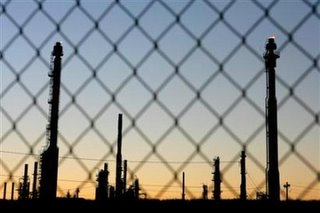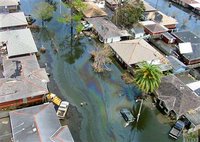Corporate and Government Responsibility: empowering citizens with information

Today I went to see a talk at UM sponsored by the Erb Institute for Environmental Justice. The speaker was Ann Rolfes, founder and Executive Director of the Louisiana Bucket Brigade (LABB). Her organization has been helping empower residents bordering refineries to confront their corporate neighbors and demand better compliance and responsibility in their industrial practices.
It was a great talk. Business majors and environmental scientists were there asking great, tough, insightful questions. It was quite inspirational to hear her stories of how her organization allowed average people, with the aid of scientists and community organizers, to collect data and present company shareholders and the legal community with the results. These acts enabled several successful class action law suits, as well as buyouts, chipping away at the lack of accountability resulting from government neglect and short-sighted corporate interest.
Particularly disturbing facts, but certainly not surprising: 1) The established laws of environmental quality are constantly being violated, and yet the EPA and DEQ do nothing to enforce them. 2) Whomever is in charge of making cancer stats available to the public is asleep at the wheel. In fact, it was suggested by other members in the audience, who had worked in Louisiana, that any agencies that collect health data seem to suppress the stats rather than make them public. See this lawsuit, where the Louisiana Tumor Registry was ordered by a judge to release information to a lawyer representing cancer victims (July 6, 2001). Potentially this is a huge public health problem. One can only imagine the cancer rates 5-10 years from now, after the sludge and slime of Katrina's toxic bath.
Rolfes message was that it's up to ordinary people to take control. This means getting citizens involved and participating in their own fate. Hence the bucket. Affected citizens keep logs and take air samples via the EPA-approved bucket. The samples are given over to a lab, and the Bucket Brigade helps citizens to do what ever action they decide with their results: buyouts or legal action or protest, etc. I also like the idea of shareholder activism where interested parties buy stock in Exxon and Shell in order to steer their corporate policies.
 Post-Katrina, the LABB is now turning their focus to soil sampling in Chalmette (bordering New Orleans) to see what refinery spills during post-hurricane flooding left behind after the flood waters receded. The results are disturbing, with arsenic and heavy metals being found on school playgrounds and in the sludge of returning citizens' homes. The EPA's official message was to "avoid contact with contaminated soil." The end. The lack of response from government and on the part of industry is amazing. However, the efforts of LABB were instrumental in the current case that is being weighed by U.S. District Court Judge Eldon Fallo as to whether or not citizens can file a class action suit against the the oil company responsible for the biggest spill during the flood (apparenlty there were more than one), Murphy Oil.
Post-Katrina, the LABB is now turning their focus to soil sampling in Chalmette (bordering New Orleans) to see what refinery spills during post-hurricane flooding left behind after the flood waters receded. The results are disturbing, with arsenic and heavy metals being found on school playgrounds and in the sludge of returning citizens' homes. The EPA's official message was to "avoid contact with contaminated soil." The end. The lack of response from government and on the part of industry is amazing. However, the efforts of LABB were instrumental in the current case that is being weighed by U.S. District Court Judge Eldon Fallo as to whether or not citizens can file a class action suit against the the oil company responsible for the biggest spill during the flood (apparenlty there were more than one), Murphy Oil.Rolfes had several examples of corporate mismanagement, such as statistics showing that the amount of money that went into publicizing supposed corporate responsibility could have gone into outfitting the refineries with hundreds of thousands of leak-proof valves. The technology to be safer exists, but the company would rather spend the money on spin and looking better rather than on being better. This becomes really apparent when googling the companies by name, as their PR people must put out dozens of press releases every day touting how conscientious the companies are. One has to really dig deep in the search results to get to the watch dog groups.
 Note the dark line on buildings showing where oil was floating on top of flood waters before they receded.
Note the dark line on buildings showing where oil was floating on top of flood waters before they receded.I am so glad people are doing something, and that methods for making change are being standardized and shared. The talk was valuable to raise awarness among emerging business and science professionals to work toward more responsible industry and business practices. Even though what is happening in New Orleans is depressing as all hell, the talk gave me hope.
So how are we going to battle the greed and mismanagement that persists in spite of human cost? Sharing information amongst ourselves. This site is a good source for global corporate policy discussions in the media, and this site is a good one to keep an eye on just what's going on out there in the realm of transnational corporations. Let's use the amazing tools of our age to inform each other. Comments and discussion welcome and encouraged.

2 Comments:
Good luck to the people of New Orleans and Louisiana! I, too, am encouraged to see residents taking matters into their own hands, and buckets. They clearly cannot count on "corporate responsibility" to look out for their health and safety ($$ spent on PR rather than on safety valves in a HURRICANE zone, etc.). Sadly, a generation or 2 of cancer victims seems to be an acceptable price to pay to avoid hemorrhaging corporate profits. The EPA is only now taking action on Teflon, though it (and Teflon producers) has known for years and years that Teflon's main chemical ingredients are powerful carcinogens that can now be detected in the blood of virtually every living creature on Earth - from human fetuses to whales in the North Atlantic. Petrochemicals pose deadly risks to all of us that are almost completely unknown, except to those whose job it is to know. Let' hear it for LABB, who are making it THEIR job to know!!
What IF ... Find me a seattle roofers Today.. If you are having problems with your roof. Look no more.. Visit us at http://rooferr.com and get the information aboutseattle roofers.. If you cant find what you need go to http;/contractorr.com ..
Post a Comment
<< Home